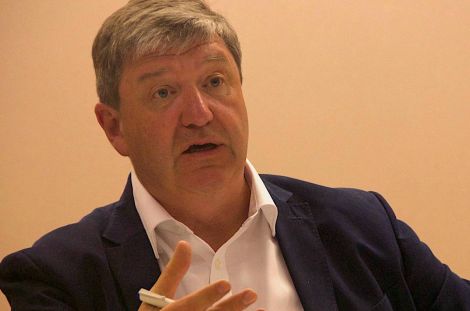News / MP condemns Tories’ Brexit bill ‘power grab’
NORTHERN Isles MP Alistair Carmichael has accused the UK Government of a “totally indefensible” power grab after the Brexit bill passed its first stage in the House of Commons on Monday night.
The European Union (Withdrawal) Bill, ending the supremacy of EU law in the UK, was passed by 326 votes to 290. Carmichael is among critics who contend that it enables the Tory government to bypass parliament.
Without the government revealing its hand, the MP said it was difficult to know precisely what the implications might be for his constituents, but he is clear that the Conservatives will continue taking decisions “through the prism of their own party split rather than the national interest”.
It was described by UK Prime Minister Theresa May as a “historic decision to back the will of the British people”. She said the vote would provide clarity and certainty as the terms of Brexit are hammered out: “Although there is more to do, this decision means we can move on with negotiations with solid foundations and we continue to encourage MPs from all parts of the UK to work together in support of this vital piece of legislation.”
Carmichael’s concern is that the EU bill affords the government the power to bring forward secondary legislation, subject to a lesser degree of parliamentary scrutiny, covering “any provision that could be made by an act of parliament”.
“It is a few short steps removed from rule by decree,” he said. “Theresa May and the Conservatives are determined to continue to do what landed our country in this mess in the first place.
“They will try to continue to manage our country’s relationship with the rest of Europe not in a way that best reflects our national interest but rather in a way that promotes the best interests of the Conservative party.
Become a member of Shetland News
“This government stitch-up is totally indefensible.”
He said it was “a lot more than just a bill to repeal the European Communities act”, and he fears it will ultimately have consequences for communities and industries such as fishing and farming.
“We still don’t know what the government’s plans are for what comes after Brexit, but it’s pretty clear that they will be the judge and jury of how that works when we get there,” Carmichael said.
“The powers that they have taken for themselves with this bill mean they can bypass parliament at will. I don’t think that’s what most people thought it would be like when they voted for the UK Parliament to take back control.
“Anything which allows government to bypass parliament will produce bad government at the end of the day. Given their history in both farming and fishing, that’s not something I’m going to sit by and be relaxed about.”
He added that the bill would now spend eight days in its committee stage where “we will go through it paragraph by paragraph”, and he noted there were several amendments with “sufficient Conservative names on them to beat the government in a vote”, so the battle is far from over.
While the fishing industry remains relentlessly upbeat in its outlook on Brexit, much greater concern has been expressed within the agriculture sector.
On Tuesday, the National Farmers’ Union (NFU) voiced concern at any prospect of Scotland losing the freedom to “implement agricultural policy in different ways to its neighbours elsewhere in the UK”.
Since devolution was introduced in 1999, the Scottish Government has been tasked with implementing the EU’s common agricultural policy (CAP) – albeit a task it has not always carried out to the industry’s satisfaction.
An NFU spokesman said: “NFU Scotland’s position is that any future policy must have significant in-built flexibility for the devolved administrations to be able to use the agricultural budget to develop policies and tools that are fitted to the unique agricultural characteristics of the different parts of the UK.”
He said a “one-size-fits-all approach” had not worked for the UK within the EU so “there is no reason to suggest the same approach would work after Brexit” within the UK.
The spokesman added that, 15 months on from the referendum, there was still “no further clarity now than there was then” on what a future agricultural policy framework might look like: “NFUS wishes to see less grandstanding and more constructive detail to emerge to allow industry to engage in a proper discussion about how to support the industry in the future.”
Pressure is raining in on the UK Government’s negotiating team, led by David Davis, from multiple angles to start giving answers on the UK’s post-Brexit arrangements in a host of areas.
Recent weeks have seen questions raised over the implications a tightening of rules on EU migrant workers might have for industries such as seafood processing and NHS Shetland’s ability to fill vacancies.
Shetland Fishermen’s Association executive officer Simon Collins said the catching industry’s view was that, while trade discussions are “vital”, “water and markets don’t mix”.
Become a member of Shetland News
Shetland News is asking its many readers to consider paying for membership to get additional features and services: -
- Remove non-local ads;
- Bookmark posts to read later;
- Exclusive curated weekly newsletter;
- Hide membership messages;
- Comments open for discussion.
If you appreciate what we do and feel strongly about impartial local journalism, then please become a member of Shetland News by either making a single payment, or setting up a monthly, quarterly or yearly subscription.




























































